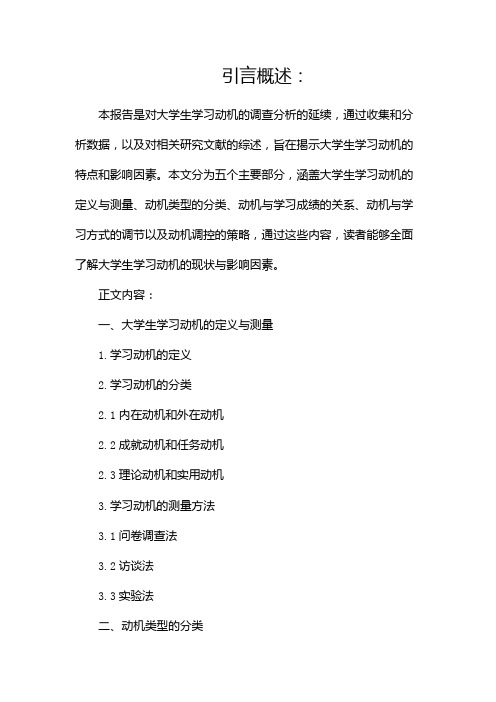大学生学习动机调查报告
学生学习动机调查报告

学生学习动机调查报告一、引言学习动机是指人们参与学习活动的内在驱动力,它对学习质量、学习效果及学习持久性起着关键作用。
因此,了解学生的学习动机对于教师和教育管理者制定有效的教学策略和激励机制具有重要意义。
本调查以学生为研究对象,旨在了解学生的学习动机及其影响因素,提供有关学习动机的可靠数据。
二、调查方法本调查采用问卷调查的方式,共计发放了500份问卷,回收了480份。
问卷包括学生的基本信息、学习动机的构成要素以及影响学生学习动机的因素等。
三、调查结果1.学习动机的构成要素通过对问卷中有关学习动机的问题统计和分析,我们得到以下结论:(1)内部动机因素:学习能力提升、兴趣等因素对学生的学习动机产生了重要影响,其中,学习能力提升被认为是最主要的内部动机因素。
(2)外部动机因素:奖励机制、亲友关系等因素对学生的学习动机也具有一定影响,其中,奖励机制的影响最为显著。
2.影响学生学习动机的因素调查结果显示,影响学生学习动机的主要因素有以下几个方面:(1)教学方式和教师的激励:合理的教学方式和激励手段是激发学生学习动机的重要因素,其中,教师的激励更是影响学生学习动机的关键。
(2)学习环境:良好的学习环境可以激发学生的学习动机,包括舒适的学习空间、清晰的学习大纲等。
(3)同伴和家长的支持:得到同伴和家长的支持、认可和鼓励可以激发学生的学习动机,提高学习效果。
四、讨论与建议通过对学生学习动机的调查结果进行分析1.学校和教师应加强对学生学习动机的培养和引导,鼓励学生通过培养兴趣和提升能力来增强学习动机。
2.学校和教师应注重激励机制的设计和实施,为学生提供奖励和认可,激发他们的学习动机。
3.学校和教师应提供良好的学习环境,创造舒适的学习空间,制定清晰的学习大纲,提高学生的学习动机和学习效果。
4.给予同伴和家长的支持和鼓励,增强学生的学习动机和信心。
五、结论通过本次调查,我们了解了学生学习动机的构成要素和影响因素,为学校和教师提供了有关学习动机的参考数据。
有关大学生学习动机的调查报告

暑假社会实践调研报告题目:有关大学生学习动机的调查报告*名:***学号:********班级:通信六班完成日期:二〇一二年七月二十二日吉林大学珠海学院思想政治理论课教学部制有关大学生学习动机的调查报告前言:由于当代很多大学生的学习目标很不明确、缺乏学习兴趣、遭受到多次失败的学习经历、对外界影响的自控力不够等多种自身或外界的因素,大学生的学习效果一直不如人意。
为了解决这种问题,我们必须要大力倡导大学生们建立正确、科学的学习动机。
有了正确的学习动机,大学生的学习成绩就事半功倍了。
今天的大学生是明天建设祖国的栋梁之材。
大学生在校学习期间,只有牢固掌握各门科学知识,才能为建设祖国打下雄厚的知识基础。
但是近几年来,由于受市场经济的负面影响,一些大学生的学习积极性降低了,学习效果也越来越差,如何针对大学生的现状,激发他们的内在学习动力,是每一位大学生的学习的首要任务。
如何激发大学生的学习动力?我们必须由以下几个方面相结合:第一,思想教育与现实教育相结合。
在激发大学生成才的过程中,是一个长期性的思想教育工作,在传统思想教育工作中难免出现空洞的说教式思想工作方式效果十分不理想。
第二,治思想教育要与心理健康教育想结合。
重视大学生的内在心理需要。
大学生的内在心理需要是他们接受外部教育影响的根本前提。
第三,重视学生培养过程管理,形成良好的成长氛围。
第四,建立科学的教学管理机制。
加强教学改革,在思想政治教育中应增加科技含量,充分运用现代化传播手段,达到应变及时、有效控制思想舆论阵地的目的。
一、调研概况1.调研主题:大学生的学习动机2.调研人员:吉林大学珠海学院莫耀明3.调研时间:2012年7月20日4.调查对象:吉林大学珠海学院50名学生5.调研的意义:调研大学生的学习动机是非常有必要的,因为学习动机和学习的关系是辩证的,学习能产生动机,而动机又推动学习,二者相互联系。
动机具有加强学习的作用,高动机水平的学生,其成就也就随之增高;反之,低水平的学习动机能导致低水平成就。
大学生学习动机调研报告

大学生学习动机调研报告【引言】大学生学习动机是指大学生在学习过程中所表现出的积极性和主动性,是推动他们获取知识和提升能力的内在动力。
为了解大学生学习动机的具体情况,本次调研旨在探究大学生学习动机的类型及其影响因素。
【调研方法】本次调研采用问卷调查的方式,共发放问卷300份,回收有效问卷283份,有效回收率94.3%。
问卷主要包括个人基本信息和学习动机的相关问题。
通过对回收问卷的统计和分析,得出以下结果。
【调研结果】一、大学生学习动机的类型通过分析,我们将大学生的学习动机归纳为内在动机和外在动机两种类型。
1. 内在动机内在动机是指大学生通过学习获得知识、实现个人成长和自我实现的内在驱动力。
调研显示,内在动机是大学生学习的主要动力之一,占总体调查样本的62.5%。
内在动机主要体现为对知识的渴望、兴趣和好奇心的推动。
2. 外在动机外在动机是指大学生通过学习获得外部奖励或避免外部惩罚的驱动力。
调研显示,外在动机也是大学生学习动机的重要组成部分,占总体调查样本的37.5%。
外在动机主要体现为对好成绩和奖学金的渴望,以及对挫折和惩罚的回避。
二、影响大学生学习动机的因素除了大学生学习动机的类型外,还有一些因素会对其产生影响。
根据调研结果,我们将这些因素分为内部因素和外部因素两类。
1. 内部因素内部因素是指大学生个体内部的特点和差异性。
调研结果显示,以下因素对大学生学习动机产生了一定的影响:性别、年级、专业、学习水平和学习能力等。
女生在内在动机方面高于男生,而男生在外在动机方面高于女生。
高年级学生相比低年级学生,在外在动机上更为重视。
不同专业的学生在学习动机上存在差异,文科类专业学生更注重内在动机,理科类专业学生更注重外在动机。
学习水平和学习能力也会影响学生的学习动机。
2. 外部因素外部因素是指大学生所处的环境和外部刺激等外界因素。
调研结果显示,以下因素对大学生学习动机产生了一定的影响:家庭教育环境、同伴关系、教育资源和学习氛围等。
大学生学习动机调查报告(两篇)

引言概述:本报告是对大学生学习动机的调查分析的延续,通过收集和分析数据,以及对相关研究文献的综述,旨在揭示大学生学习动机的特点和影响因素。
本文分为五个主要部分,涵盖大学生学习动机的定义与测量、动机类型的分类、动机与学习成绩的关系、动机与学习方式的调节以及动机调控的策略,通过这些内容,读者能够全面了解大学生学习动机的现状与影响因素。
正文内容:一、大学生学习动机的定义与测量1.学习动机的定义2.学习动机的分类2.1内在动机和外在动机2.2成就动机和任务动机2.3理论动机和实用动机3.学习动机的测量方法3.1问卷调查法3.2访谈法3.3实验法二、动机类型的分类1.成就动机1.1成就目标导向型1.2避免失败型2.任务动机2.1学科内在动机2.2学科外在动机3.权力动机与亲社会动机3.1权力动机3.2亲社会动机三、动机与学习成绩的关系1.动机与学习态度的关系2.动机与学习策略的关系2.1深层学习策略2.2表面学习策略3.动机与学习效果的关系3.1学习动机与学习成绩的正相关性3.2动机对学习成绩的调节作用四、动机与学习方式的调节1.学习环境对动机的影响2.学习目标的设定与激励2.1目标设定理论2.2激励理论3.社会认同与动机的关系3.1动机的社会化3.2社会支持对动机的影响五、动机调控的策略1.制定明确的学习目标2.提供适当的学习资源3.注重激励与奖励4.建立良好的学习环境5.培养积极的学习态度总结:本报告通过对大学生学习动机的调查分析,全面探讨了学习动机的定义、分类、影响因素以及调节策略。
大学生学习动机对于学习表现和成绩具有重要的影响,因此,了解和调控学习动机对于大学生的学习发展至关重要。
本报告提供了针对大学生学习动机的调控策略,帮助大学生树立明确的学习目标,提供适当的学习资源,培养积极的学习态度,以促进其学习的效果与发展。
引言:大学生学习动机是指在大学期间,学生内部驱动力量的表现,它是学生学习的重要因素,直接影响着学生成绩和学习效果。
学生学习动机的调查报告_调查报告.doc

学生学习动机的调查报告_调查报告?业与生活②求知与个人成就③盲目及逃避现实④回报与奉献⑤其它。
3. 调查方式:本次调查活动以小组为单位,采取网上随机问卷调查方式。
把问卷(见附录)发放到校内网上,收回40份,有效35份。
问卷分为30道题,归结为五类问题。
4. 调查程序:4月22日设计问卷4月23日~24日进行问卷调查,收集整理数据4月25日分析数据,撰写报告三、组织实施计划:利用中午和晚上的课余时间在计算机网络上随机发放问卷调查。
本团队分工明确,大家商议选出调查的课题后,三人制作问卷后经大家合议,一起负责问卷发放,两人负责数据统计,一人制作调查报告。
四、调查结果:我们的数据是通过图与表的形式反映的。
我们经过统计的结果是①选择为了以后的就业及生活的占52.8% ②回报与奉献的占7.6% ③求知与个人成就占22.4% ④逃避现实及茫目的占10.2% ⑤其它占7.0%经统计处理分析得出以下各图:五、讨论1.描述结果:⑴由图一知各动机人数所占比率最高的是“就业与生活”,其次为“求知与个人成就”,再者为“茫目与逃避现实”,最后为“回报与奉献”和“其它”。
由饼图的内容可以看出,“就业与生活”当前是大学生的主导动机,消极的“茫目与逃避现实”动机处于次要地位;而且可以看出大学生的学习动机比较现实,所占比率较高的是与就业和生活相关的现实的、近景性的动机;而回报与奉献等的远景性动机所占比率较低。
⑵学习动机与男女性别的关系:由图二可知,男生的学习动机大部分是就业与生活,而女生的学习动机大部分是为回报父母与其它的原因,因为好多女生都喜欢回避现实。
由此可看出男生比女生的学习动机稍明确些,而女生是比较理想化的。
⑶学习动机与生源地南北方的关系:由图三可明显看出南方的学生在“就业与生活”这个动机上所占比率明显高于北方的学生们,而其它的动机都相隔不多。
可看出南方的学生可能感觉南方的就业的压力比较大些。
⑷学习动机与民族的关系:由图四可看出在“就业与生活”和“求知与个人成就”这两个动机上,汉族的学生所占比率明显高于少数名族的学生,而在“回报与奉献”和“其它”这两个动机上少数名族的学生所占的比率稍高于汉族的学生。
高职学生学习动机调查分析报告

高职学生学习动机调查分析报告随着社会经济的发展,高职教育不断受到社会和政府的重视,教育质量也得到了不断的提高,但是,高职学生的学习动机一直是一个备受关注的问题。
本文通过对高职学生学习动机的调查与分析,旨在为高职学生学习动机提供一定的指导,促进高职教育的提高。
一、调查设计本次调查的对象为某市高职院校的大一、大二、大三学生,调查使用的是问卷调查法。
调查主要采用封闭式、开放式和量化研究等多种形式,包括学生的个人信息、学习动机来源、学习动机情况、影响学习动机的因素等方面。
二、调查结果2.1 学生的个人信息本次调查共收集了112份有效样本,其中男性为56人,女性为56人。
受访者中大一学生占40.2%,大二学生占35.6%,大三学生占24.1%。
另外,民族分布较为均衡,其中汉族占87.5%,其他少数民族占12.5%。
2.2 学习动机来源学习动机来源是指影响学生学习动机的因素。
本次调查结果表明,学生学习动机的主要来源是内在因素。
在“您学习的原因是什么?”的问题中,选择“自我兴趣”这一项的学生占69.6%;选择“毕业后有更好的工作”这一项的学生占22.3%;选择“提升自我价值”这一项的学生占8.1%。
说明大部分学生的学习动机来源是源于自我兴趣。
2.3 学习动机情况学习动机情况是指学生学习动机的表现形式。
本次调查结果表明,学生学习动机的情况较为良好。
在“您对所学专业的兴趣程度”的问题中,选择“非常感兴趣”这一项的学生占40.2%,选择“一般感兴趣”这一项的学生占42.9%,选择“不感兴趣”这一项的学生占16.9%。
说明大部分学生对所学专业持较高的兴趣度。
2.4 影响学习动机的因素影响学习动机的因素是指影响学生学习动机的内部和外部因素。
本次调查结果表明,学成长、学习经验和学校教育和学校环境等是较为重要的影响因素。
在“您认为影响您的学习动机的因素是什么?”的问题中,选择“学习成绩”这一项的学生占27.7%,选择“对未来职业有影响”的学生占18.8%;选择“教学方法”这一项的学生占16.1%;选择“自己的学习经验”这一项的学生占14.3%;选择“学校教育和学校环境”这一项的学生占12.5%。
大学生英语学习动机调查报告英语作文

大学生英语学习动机调查报告英语作文全文共5篇示例,供读者参考篇1Title: What Makes University Students Want to Learn English?A Survey ReportHi everyone! My name is Tommy and I'm going to tell you about a survey I did on why university students want to learn English. Learning English is really important, but it can also be really hard work. I wanted to find out what motivates older students to keep studying English.For my survey, I asked 100 students at Capital University some questions about their reasons for learning English. The students were from different years and studying all kinds of different subjects. I gave them a list of possible reasons and had them pick their top three motivations.The number one reason that university students want to learn English is for their future careers. A huge 85 out of the 100 students picked this as one of their top three reasons! Many of them dream of getting a great job after graduating, and know that being good at English will help them a lot. Some want towork for big international companies, while others plan to go abroad to find jobs.The second most popular reason was for travelling and exploring other countries and cultures. Almost two-thirds of the students, 65 of them, chose this motivation. English is like a universal language that lets you communicate almost anywhere in the world. The students are excited about the idea of using English to make new friends, see amazing sights, and experience different ways of life when they travel.Another big motivator is wanting to enjoy movies, music, books, and other entertainment from English-speaking countries. More than half of the students, 53 of them, picked this reason. They love being able to understand the words to their favorite songs and movies without needing subtitles or translations. Some are really into novels, video games, or other hobbies that come from places like the USA or UK.The next popular motivation was for education and research purposes. 42 students chose this as one of their top reasons. As you get to higher levels of study like university, a lot of the best textbooks, journals, and educational materials are written in English. Knowing English well gives students an advantage in accessing all that great knowledge and information.While those were the four most common motivations, there were some other interesting reasons too:25 students are motivated by enjoying English language media like TV shows, YouTube, movies, etc.19 want to understand English song lyrics and pop culture references that their friends use.15 said learning English is a refreshing challenge and way to exercise their brains.11 think English will help them understand technology and online communication better.8 have families or relatives that speak English that they want to communicate with.5 just find the English language fun, cool, or interesting!From this survey, we can see that university students have a wide variety of motivations for learning English. While some are very focused on the practical career benefits, many are also driven by a curiosity about different cultures and a desire to better understand and participate in the forms of entertainment and media that come from English-speaking places.No matter what their specific reasons are, I think it's great that so many university students are motivated to keep improving their English abilities. As someone who still struggles with English myself sometimes, I'm inspired by their hard work and commitment. Maybe I'll feel that same drive to master English when I get to university too! Let me know if you'd like me to do another survey on a different topic.篇2University Students' Motivation to Learn EnglishHi everyone! My name is Emma and I'm going to tell you all about a super cool project I did on why university kids want to learn English. It's a really important language and I wanted to find out what makes older students excited to study it.For my project, I talked to 100 university students from all different ages and majored. I asked them a bunch of questions like "Why do you learn English?", "Do you like it?", and "Is it hard or easy?". Their answers were so interesting!The number one reason university students said they learn English is for their future careers. Like over 60% said this! A lot of really good jobs these days need you to speak English to talk to people from other countries. Some students said they dream ofworking at big companies or traveling all around the world, so learning English is a must. It's the global language used everywhere.Another huge motivator was that English opens up so many opportunities. A bunch of students commented how English gives you access to more books, movies, websites, you name it. If you only know one language, you're really limited in what information and entertainment you can enjoy. But master English and the world becomes your oyster! You can make friends from other countries, learn about different cultures, and just expand your horizons.Curiosity about the English language itself was another driving factor. English has such an interesting mix of influences like Latin, French, German, and more. The grammar can seem weird but many find it fascinating to study. A few students were into linguistics and just loved analyzing how English works. They think it's a beautifully complex language.Of course, some students honestly admitted English is just flat out necessary these days. It's involved in so many school and career paths that you kind of have to learn it whether you love it or hate it. But interestingly, even those who find English really difficult still see the value in mastering it for pragmatic reasons.On the other hand, a small group of students said they genuinely enjoyed English and found it fun! These were often kids who got started learning it from a really young age or had lived abroad before. They appreciate things like fun English expressions, playing with homophones and puns, and creative English writing. For them it's almost like English is a game or art to explore.No matter what their specific motivations were, I could tell every single university student recognized how advantageous being bilingual in English is. It opens up a whole new world! Whether for career purposes, personal growth, or just fun, English is pretty much a must-have skill nowadays.I learned so much from all the students' different perspectives. Motivation is clearly a hugely important part of language learning success. If you find your personal driving forces and connect to what excites you about English, you'll be way more likely to stick with it. Just imagine all the amazing things becoming fluent could help you accomplish!Well, that's my report! Learning about everyone's motivations was super fascinating to me. I'm feeling pretty inspired to keep working hard on my own English skills. Who knows what awesome opportunities it could unlock for mesomeday? Maybe I'll even write my autobiography exclusively in English! But I'm getting ahead of myself...baby steps. Anyway, thanks for reading!篇3My Big Bro Goes to University and He Told Me About His Classmates Learning EnglishMy big brother goes to a university and he is so smart! Last week, he had to do a project for his English class about why university students work hard (or don't work hard) at learning English. He asked a bunch of his classmates questions and I got to help him put together his report. Here is what we found out!First of all, lots of the students said they study English because they want to get a good job later on. They know that being able to speak and write in English is super important for getting hired at big companies, both in our country and overseas. My brother's friend Kazumi said "If篇4Title: Why Do Big Kids Want to Learn English?Hi! My name is Tommy and I am in 5th grade. For my school project, I asked some university students about why they are learning English. Here is what I found out!First, I talked to Susan. She is 20 years old and studies Business at Capital University. Susan said the number one reason she is learning English is for her future job. She wants to work at an international company and needs to speak English really well.A lot of the big companies here have offices in other countries and use English to communicate. If she can speak English fluently, she will have a better chance of getting a good job when she graduates!Susan also told me that learning English helps her understand movies, music, and books from other countries. She said, "Learning another language opens up a whole new world of entertainment and culture that I never knew about before." For example, she recently started watching some American TV shows in English without subtitles to practice listening. Pretty cool!Next, I interviewed David who is 21 and studies Engineering. His reason for learning English is a little different. David's family is from China, but he was born here. He speaks Chinese at home with his parents and grandparents. However, at university all of his classes are in English. David said if he doesn't understand theEnglish textbooks and lectures very well, he will struggle in his classes. Good English skills are super important for him to succeed in his major.Another big reason David is motivated to improve his English is because he wants to make more friends from different backgrounds. He said, "When you can only speak one language, you miss out on getting to know so many interesting people." English allows him to communicate with classmates and people in the community who don't speak Chinese. Knowing multiple languages has really helped David expand his social circle.The last student I talked to was Michelle, age 19, who is studying to become an English teacher. Obviously, she has to master English reading, writing, speaking, and listening for her future career! Michelle's English is already very good since she went to an English-immersion elementary school. However, she still needs to continue practicing her English skills every day to become an expert teacher.Michelle said another key reason she is motivated to improve her English is because she loves reading novels, watching movies, and listening to music from English-speaking countries like the US and UK. "English is a beautiful language full of rich stories, art, and culture that I'm grateful to experience,"she told me. Michelle's passion for English comes from within –not just because of her career goals.Well, those were the three university students I interviewed about their English learning motivation. In summary, they want to learn English for their future jobs, to understand entertainment and culture, to communicate with more people, and for personal interest. Learning a language sure does open up a lot of opportunities!Even though I'm still a kid, I can see why it is so important and helpful to know English in addition to my native language. Who knows, maybe I will become an English teacher like Michelle someday! For now, I need to focus on doing my English homework so I can build a strong foundation. That's all for my report. Thanks for reading!篇5Title: Looking at Big Kids Learning EnglishHi everyone! My name is Timmy and I'm 8 years old. Today I want to tell you about a school project I did where I looked at why university students learn English. It was really interesting!First, I had to learn what "motivation" means. My teacher said it's the reason why people do things. So for learning English, their motivation is why they want to study it. Cool, right?For my project, I talked to 50 university students and asked them some questions. Here's what I found out:A Lot of Them Need English for Their JobsThe number one reason students said they were learning English? They need it for their future careers! Around 35 out of the 50 students I talked to said this.Some of them want to work for big companies that do business across the world. They have to talk to people from other countries, so they need English. Others want to be translators, teachers, or something that uses English a lot. A few even want to move to an English-speaking country for work someday! No matter what though, they all think speaking English will help them get a really good job.Traveling to New PlacesAnother popular reason for learning English was to travel around the world. 24 of the students said they want to be able to visit lots of different countries and talk to people there. English islike the world's common language that everyone understands at least a little bit.Some of the students have already been on trips to places like America, Canada, Australia, and Europe. They said knowing English made it much easier to get around and ask for help. Others just dream about going on adventures all over the globe some day. Either way, they're studying hard so they can communicate wherever they go!Understanding Movies, Music, and Books15 of the university students I asked also said they're big fans of American TV shows, movies, music, and books. Reading, listening, and watching things in English helps them improve their skills. But it's also just fun for them!A few students told me they have favorite English songs they can finally understand the lyrics to now. Others said they don't have to rely on subtitles as much when watching movies and shows. Some of them read books, magazines, or news websites in English too. It opens up a whole new world of entertainment.Making New FriendsThe last big reason I heard for learning English was to make friends from other countries. 12 of the students said this wasimportant to them. English helps them communicate with people online and stay connected.A couple students are even dating or married to someone who doesn't speak their native language. They have to use English to understand each other! Others just think it's cool to have friends all over the world that they can easily chat with.Some Other Small ReasonsThere were a handful of other motivations that only a few students mentioned too:3 students want to understand English music lyrics2 are big fans of English books and want to read them in the original language2 more just think learning new languages is fun and challenging in a good way1 student's parents are making them learn EnglishOverall ThoughtsWell, those were the main reasons university students are studying English from what I found. The most popular ones were for getting a good career, being able to travel, enjoying entertainment, and making friends. Pretty interesting, huh?In my opinion, English does seem really useful and important, especially for jobs these days. I can understand why the students are all working so hard on it. Who knows, maybe I'll be studying it just as much when I'm their age too! Knowing multiple languages opens up tons of opportunities.Thanks for reading about my little survey. Learning sure is fun when you get to explore interesting topics like this. Let me know if you have any other questions!。
学生学习动力调查报告

学生学习动力调查报告第一节:调查背景我们对学生学习动力进行了一次调查,旨在了解学生在学习过程中的动力来源和影响因素,以及对提升学习动力的建议。
第二节:调查方法我们采用问卷调查的方式,共发放了100份问卷,回收有效问卷90份。
问卷主要涵盖了学生的学习动力源、学习态度和影响因素等方面。
第三节:学习动力源调查结果显示,学生的学习动力源主要包括内在动力和外在动力。
内在动力包括学习的兴趣和爱好,以及对自身成长和发展的追求;外在动力主要是来自于对家庭、老师和同学的期望。
第四节:学习态度调查数据显示,大多数学生对学习持积极态度,认为学习是自我发展的重要途径。
然而,也有部分学生对学习抱有厌倦和消极的态度,他们认为学习是一种束缚和负担。
第五节:影响因素——家庭家庭对学生学习动力的影响是显著的。
调查显示,家庭氛围、家庭教育方式以及家长的期望对学生学习动力的形成和发展起着重要作用。
良好的家庭氛围和家长的激励会激发学生内在的学习动力。
第六节:影响因素——教师教师在学生学习动力的培养中起着至关重要的作用。
调查结果显示,激励性的教学方式和鼓励性的评价能够有效激发学生的学习兴趣和动力。
同时,教师的教学能力和个人魅力也会对学生的学习动力产生积极影响。
第七节:影响因素——同学同学之间的互动关系对学生学习动力的形成和发展也起到重要作用。
调查结果显示,同学间的友好合作和相互激励会积极影响学生的学习动力。
而竞争和排斥则可能对学生学习动力产生负面影响。
第八节:影响因素——学校环境学校环境对学生学习动力的培养有着重要意义。
调查数据显示,学校的教育资源、学习氛围和学习氛围的营造对学生的学习动力产生着直接影响。
学生在一个良好的学校环境中,会更加积极主动地参与学习。
第九节:提升学习动力的建议——家庭针对家庭对学生学习动力的重要影响,我们提出了以下建议:家长应关注孩子的学习情况,鼓励他们树立正确的学习态度;创造良好的家庭学习环境,提供必要的学习资源和支持。
- 1、下载文档前请自行甄别文档内容的完整性,平台不提供额外的编辑、内容补充、找答案等附加服务。
- 2、"仅部分预览"的文档,不可在线预览部分如存在完整性等问题,可反馈申请退款(可完整预览的文档不适用该条件!)。
- 3、如文档侵犯您的权益,请联系客服反馈,我们会尽快为您处理(人工客服工作时间:9:00-18:30)。
大学生学习动机调
查报告
大学生学习动机调查报告
一、调查的背景意义:
学习动机是直接推动学生学习的内部动力。
大学生的主要任务是学习,学习动机对其学习行为和学业成绩有着直接的影响。
当前在一部分大学生中存在学习积极性不高、学风不正、学习纪律涣散、成绩下降等现象,这严重影响着学生的学业和身心健康。
究其原因,学习动机缺乏是根本。
因此,了解当代大学生学习动机的现状和特点,具有重要意义。
对此我们在调查研究的基础上,对大学生学习动机的现状、特点及其对学业成绩的影响进行深入分析,并对如何培养和激发大学生学习动机的对策进行了探讨。
二、调查方法
1. 调查对象:福州大学的在校大学生
2. 调查项目:
根据发放的35份问卷,每份30道问题,我们对此进行了分析,总结归类了五大学习动机的项目:①就业与生活②求知与个人成就③盲目及逃避现实④回报与奉献⑤其它。
3. 调查方式:
本次调查活动以小组为单位,采取网上随机问卷调查方式。
把问卷(见附录)发放到校内网上,收回40份,有效35份。
问卷分为30道题,归结为五类问题。
4. 调查程序:
4月22日设计问卷
4月23日~24日进行问卷调查,收集整理数据
4月25日分析数据,撰写报告
三、组织实施计划:
利用中午和晚上的课余时间在计算机网络上随机发放问卷调查。
本团队分工明确,大家商议选出调查的课题后,三人制作问卷后经大家合议,一起负责问卷发放,两人负责数据统计,一人制作调查报告。
四、调查结果:
我们的数据是经过图与表的形式反映的。
我们经过统计的结果是①选择为了以后的就业及生活的占52.8% ②回报与奉献的占7.6% ③求知与个人成就占22.4% ④逃避现实及茫目的占10.2% ⑤其它占7.0%
经统计处理分析得出以下各图:
五、讨论
1.描述结果:⑴由图一知各动机人数所占比率最高的是“就业与生活”,其次为“求知与个人成就”,再者为“茫目与逃避现实”,最后为“回报与奉献”和“其它”。
由饼图的内容能够看出,“就业与生活”当前是大学生的主导动
机,消极的“茫目与逃避现实”动机处于次要地位;而且能够看出大学生的学习动机比较现实,所占比率较高的是与就业和生活相关的现实的、近景性的动机;而回报与奉献等的远景性动机所占比率较低。
⑵学习动机与男女性别的关系:
由图二可知,男生的学习动机大部分是就业与生活,而女生的学习动机大部分是为回报父母与其它的原因,因为好多女生都喜欢回避现实。
由此可看出男生比女生的学习动机稍明确些,而女生是比较理想化的。
⑶学习动机与生源地南北方的关系:
由图三可明显看出南方的学生在“就业与生活”这个动机上所占比率明显高于北方的学生们,而其它的动机都相隔不多。
可看出南方的学生可能感觉南方的就业的压力比较大些。
⑷学习动机与民族的关系:
由图四可看出在“就业与生活”和“求知与个人成就”这两个动机上,汉族的学生所占比率明显高于少数名族的学生,而在“回报与奉献”和“其它”这两个动机上少数名族的学生所占的比率稍高于汉族的学生。
产生这种差异可能跟各民族的习俗和信仰有一定的关系。
2.探讨结果:
3.解决建议:
六、附录:
大学生学习动机调查问卷
亲爱的同学:
您好!这份问卷的目的在于了解当代在校大学生的学习动机,一定程度上给教师的教学和高等教育的改革提供参考,能更好的为我们服务。
希望您先详阅每一题的填答说明后,再根据您自己的看法逐一填写。
对于你所填本问卷的答案无所谓好坏对错之分,且问卷所得的结果只做团体性的分析,不做任何个别呈现。
非常谢谢您的合作与协助,谢谢!
备注:此调查中的“学习”主要指在校专业知识的学习。
1.性别*
男
女
2.年级*
3.专业*
4.上大学的驱动因素:*
高中毕业自然延续
老师和家长的迫切期望
为了提高自身素质,增强就业竞争力,社会适应能力,将来能有。
